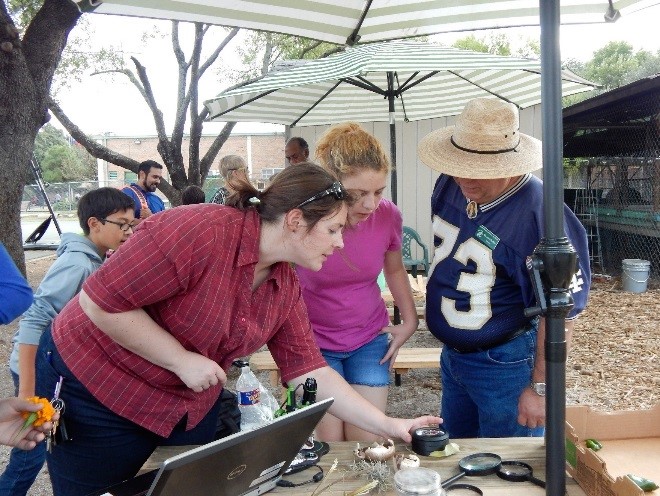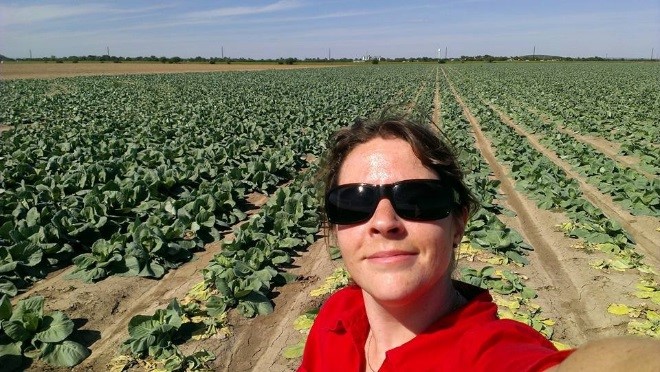 Time in that position: 1 year
Time in that position: 1 year
Distribution of efforts: 100% Extension
Degree held, thesis/dissertation topic: PhD in plant science with an emphasis in plant pathology and soybean seed quality & vigor
Commodity assignment: All crops of the winter garden & surrounding area. My assignment is unique in that there are major crops in production continually through the year in my district. In fact, the area grows 25+ crops including grape, pecan, spinach, cabbage (and other leafy veggies), sesame, carrots, cotton, corn, onion, cucurbits, forage crops, peanuts, olive and many others. My district covers over 20 counties in an area that ranges from both very rural to two of Texas’s largest urban centers, Austin and San Antonio.
Year round duties, as scheduled:
Minimum of 2 to 3 educational activities per month, usually more. I provide a variety of educational programs including year round Master Gardener intern trainings, 4-5 hour courses; CEU pesticide applicator license education programs, usually 1 hour presentations; crop specific educational programs; plant pathology and ag science awareness outreach programs with youth and general public. Diagnostic support for clientele in my district, county agent support and training, and participation in field demonstrations.
Typical workload in spring:
Spring is a busy time; leafy veggies are winding down while other vegetable crops are in production. Corn, peanuts, cotton, and other warm season crops are being planned and planted, so education and planning programs are in demand. The amount of samples I receive varies greatly with how favorable the environment is for disease. I also have my own research projects (for winter crops like leafy veggies), and warm season crop projects are starting or being planned.
Typical workload in summer:
Summer has a moderate to sporadically heavy workload with diagnostic support and education programs. Warm season crops like corn, sorghum, and cotton are in season in south Texas, and sesame can be planted well into early to mid-summer. Diagnostic needs are influenced significantly by the weather conditions. Education meetings and post season summaries are for winter crops are in demand during summer. I try to write and catch up on reading during this season.
Typical workload in fall:
Fall is very busy, as CEU (education credits for pesticide applicator license) courses are always in high demand to meet the December deadlines. Fall is also planting time for our winter crops like leafy vegetables. Other vegetables, such as cucurbits are also in the fields at this time and require diagnostic support.
 Typical workload in winter:
Typical workload in winter:
Winter is the peak season of vegetables, particularly leafy vegetables. This is also when strawberries and, onions, and carrots are planted for harvest in early to late spring. This is a very busy time with diagnostic needs and disease management support, especially if wet and overcast conditions occur. It is warm enough in south Texas during winter that bacterial and fungal pathogens can become challenging in vegetable production. There is usually a moderate demand for all education programs during the winter.
Most rewarding thing about working in Extension:
Working directly with producers to help them develop management plans that make a difference in their livelihood is rewarding. I enjoy field visits with clients and working with them to find solutions that suit their needs. I also really enjoy having a job that is both lab and field oriented with something new.
Challenges with Extension work; what early career professionals need to know:
The hours and achieving work/life balance is challenging, especially in the peak crop production times. Individuals looking into Extension careers should know that it is both rewarding and demanding of your time and energy. When working with specialty crops, you may have to be creative with finding funding sources and stretching the funding you have. Some specialty crops may have working groups or producer associations, both of which can be helpful in obtaining funding.
The way Extension is evaluated at your institution. Briefly describe the way tenure and/or promotion differs compared to research or teaching positions.
Promotion is based on performance evaluations, publication record, grant dollars obtained, and impacts on local clientele with programs you create or participate in. The PLPM Dept. at TAMU has a mentoring committee for new hires. This group helps you navigate the promotion/tenure path and to stay on track to timely promotion.
Advice to graduate students and early career professionals who want to pursue a career in Extension:
As a graduate student participate with activities that will groom your skills for working with the public and stakeholder clientele. Activities like volunteering to hold outreach events and presentations, visiting and working with producer associations when possible, and working with crops outside of the focus of your program are all good ways to gain experiences that would be useful in an extension career. Additionally, if you have worked primarily in the lab, volunteer to help with field projects or ask professors if you can ride along to field visits to gain experience with crop production systems. As an early career professional, spend time planning how you want to build your program and what you want it to be. Make a plan for your vision of your program and revise it regularly. Visit with stakeholders to build rapport, determine what their needs are, and build a program that is reflective of those needs. Lastly, careers in extension can be demanding of your time and energy, and having a solid support network in your personal life can be invaluable.
